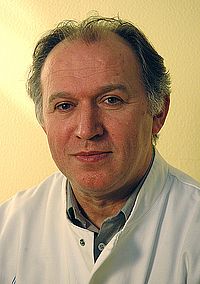You are here: vision-research.eu » People » Researcher » Thanos, Solon
Solon Thanos
Short CV
- Born 1954, studies in Biology and Medicine in Tübingen,
- Post-doc McGill University, Montreal.
- Resident in Ophthalmology, Schilling Professorship,
- calls to Tübingen, Leipzig, Hamburg, Heidelberg and Münster.
- Since 1996 head of the Department of Ophthalmology, Münster
Documents
CV of Solon Thanos [pdf]
Scientifc Interest
- To restore the optic nerve diseases after injury and glaucoma.
- Understand the molecular mechanisms of axonal growth in vivo and in vitro.
- Treatment of glaucomatous optic neuropathy.
- To translate basic science into clinical use.
Memberships
- German Society of Ophthalmology (DOG)
- Association for Research in Vision and Ophthalmology (ARVO)
- Society of Neuroscience (USA)
- Hellenic Society of Neuroscience (Greece)
Research Group
Neuroregeneration
Contact
University Eye Hospital Münster
Department of Ophthalmology
Domagkstraße 15
48149 MünsterGermany
Phone: 0049-251-835615
Fax: 0049-251-835616
Email:
solon[at]uni-muenster.de
Website:
experimentelle-ophthalmologie.klinikum.uni-muenster.de
Key Publications
- Oellers P, Schröer U, Sener V, Paulus W, Thanos S.
ROCKs are expressed in brain tumours and required for glioma-cell migration on myelinated axons.
(GLIA, 2008, E-version online) - Charalambous P, Hurst L.A., Thanos S.
Engrafted chicken neural tube-derived stem cells support the innate propensity for axonal regeneration within the rat optic nerve.
IOVS, 2008, 49(8): 3513-3524 - Fischer D, Hauk TG, Müller A, Thanos S.
Crystallins of the beta/gamma-superfamily mimic the effects of lens injury and promote axons regeneration.
Mol Cell Neurosci, 2008, 37(3): 471-479 - Schröer U, Volk GF, Liedtke T, Thanos S.
Translin-associated factor-X (Trax) is a molecular switch of GAP-43 that controls axonal growth.
Eur J Neurosci. 2007, 26(8): 2169-2178 - Lasseck J, Schröer U, Koenig S, Thanos S.
Regeneration of retinal ganglion cell axons in organ culture is increased in rats with hereditary buphthalmos.
Exp. Eye Res. 2007, 85(1): 90-104 - Liedtke T, Schwamborn, JC, Schroeer, U, Thanos S.
Elongation of axons during regeneration involves retinal crystallin beta b-2 (crybb2).
Mol Cell Proteomics. 2007, 6(5): 895-907 - Liedtke T, Naskar R, Eisenacher M, Thanos S.
Transformation of adult retina from the regenerative to the axonogenesis state activates specific genes in various subsets of neurons and glial cells.
Glia. 2007; 55(2):189-201. - Naskar R, Thanos S.
Retinal gene profiling in a hereditary rodent model of elevated intraocular pressure.
Mol Vis. 2006;12:1199-210. - Stupp T, Pavlidis M, Busse H, Thanos S.
Lens epithelium supports axonal regeneration of retinal ganglion cells in a coculture model in vitro.
Exp Eye Res. 2005; 81(5):530-8 - Fischer D, Petkova V, Thanos S, Benowitz LI.
Switching mature retinal ganglion cells to a robust growth state in vivo: gene expression and synergy with RhoA inactivation.
J Neurosci. 2004; 24(40):8726-40.



